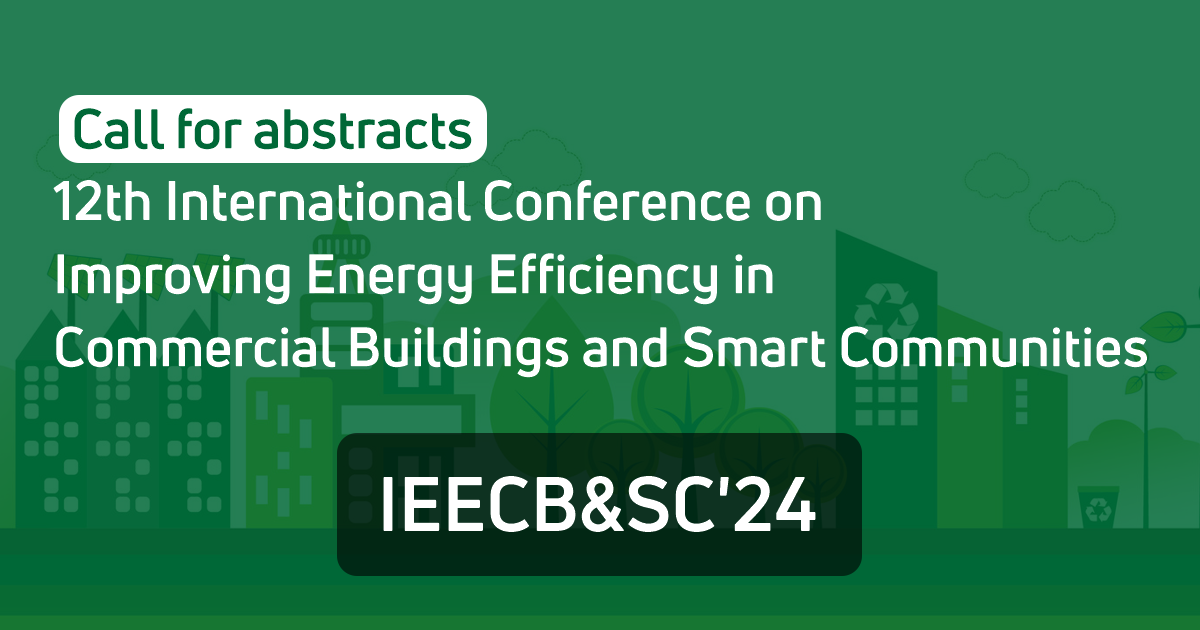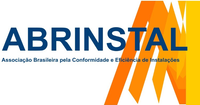
Está aberto o período de chamada de trababalhos (call for abstracts) para a 12th International Conference on Improving Energy Efficiency in Commercial Buildings and Smart Communities (IEECB&SC’24), que é organizada em conjunto com a European ESCO Conference. O evento acontecerá em Frankfurt (Alemanha), de 6 a 7 de maço de 2024, durante a Light+Building trade show. As inscrições de trabalhos vão até dia 31 de outubro.
Mais informações:
Call for Abstracts for IEECB&SC’24 and the European ESCO Conference.
Previous editions of the IEECB&SC conference have attracted key international researchers and experts on energy efficiency in non-residential buildings and smart communities, district and cities. Similarly the European ESCO Conference has in the past attracted ESCOs, policy makers technical solutions providers and sustainable construction and energy financiers.
The conference is mainly addressed to researchers and experts, policy makers, ESCOs, utilities, buildings energy and environmental managers, buildings engineers and architects, equipment manufacturers and commercial property investors, urban planners, with the aim to promote and diffuse the concept of energy efficiency and sustainability in new and existing non-residential buildings and enlarge the market for energy neutral or positive and sustainable non-residential buildings. The conference covers also the topic of smart, sustainable and positive districts, communities and cities covering energy systems and transport, efficiency technologies, digitalisation, renewable energies and optimised solutions at district or city level.
The conference aims at attracting international experts, academics, manufactures, ESCOs and policy makers to allow exchanges of experiences and best practices among different regions, countries and continents.
Accepted abstracts will be presented at the conference (oral presentation with slides).
Selected authors have the possibility, if they wish so, to prepare a peer reviewed paper to be published in the book of the proceedings and/or ISI journal.
There will be no registration fees for accepted presenters, including co-authors.
The deadline for the submission of abstract is 31st October 2023.
Potential authors are invited to submit abstracts in the following topics (indicative lists, other topics related to the main theme of the conference could also be proposed):
1. Lighting, Appliances and Equipment: technologies (light sources, LEDs, luminaires, control gear, and control systems), day-lighting, Green Lights programmes, lighting quality and energy efficiency, simulation and design tools, commercial refrigeration, cooking and washing, vending machines, lifts, equipment labelling and standards, test methods. Circular Economy. Digitalisation. Policies
2. Building envelope, passive techniques and HVAC: low energy cooling techniques, passive cooling and natural ventilation, solar cooling, techniques for low energy fluid movement, heat/cool storage, indoor air quality and energy efficiency, test methods and simulation tools, building and ductwork airtightness, façade technologies (e.g. double skin facades, roofing, etc.),new insulation and phase changing materials, electrification.
3. Examples of advanced/demonstration buildings: results of new building concepts and smart buildings; successful refurbishment, successful integration renewable energy sources and energy storage, buildings integrated planning for energy efficiency, Zero-Energy, Carbon Neutral and Positive buildings, office buildings, supermarkets and commercial/shopping centres, hospitals and schools, airport & train stations.
4. Information and communication technology (ICT) equipment and data centres: data centres design and optimisation, efficient servers, network and storage equipment, the impact of internet on commercial building consumption, data networks, telecom and broadband networks energy efficiency, policy programme for ICT. Role and impact of Blockchain and Artificial Intelligence.
5. Renewable energy sources, distributed electricity and energy storage: co-generation and poly-generation, micro turbines, heat pumps, fuel cells, biomass boilers and renewable energy sources (solar thermal, PV, etc.), successful PV building integration, building as centre of the smart grid, district heating and cooling, energy communities and co-operatives.
6. Control Systems, IoT and Building Energy Management Systems (BEMS), Digitalisation and AI: R&D &technologies, successful implementation, impact on energy consumption and indoor quality. Smart building and district. Role of AI and IoT to foster carbon reductions. Impact of AI on data centre consumption.
7. Energy and facility management, ESCOs, new energy services: continuous commissioning and retro commissioning, energy audits, optimisation of building operation, energy management, role of the energy/facility manager, operation and maintenance, outsourcing of building energy management, education and training of facility managers. Energy service companies (ESCOs),Energy Performance Contracting, financial institutions, public-private partnerships, new financial options, carbon financing, M&V, IPMVP.
8. Policies and Programmes (local, national or International): building codes (new and existing buildings), building certification, code compliance, best practice programmes, energy audits, energy companies obligations (EERs, white certificates, etc.), national and local energy efficiency funds, Green Buildings and Energy Star programmes, building rating, building quality labels, voluntary building certification systems, Life Cycle Costing (LCC), programme evaluation, green procurement, building code compliance, national roadmaps for nearly zero-energy buildings, building renovation and cost-optimality, role of buildings and cities in reaching climate targets (e.g. 1.5 C).
9. Energy consumption monitoring and benchmarking, Energy Modelling of Building and district performances: building/district monitoring campaigns, data analysis and assessment of consumption of specific equipment, assessment of building standby consumption, energy efficiency indicators for buildings, benchmarking, understanding and fixing the disconnect between predicted and measured performance, dynamic simulation methods, software and tools for design of low-energy/zero and positive buildings and building systems, GIS systems. Building maps in cities, Monitoring of city energy consumption and carbon emissions.
10. Demand response and Flexibility: Demand Response programmes and technologies, dynamic tariffs, results and evaluation, practical implementation in non-residential buildings, impact of real time energy consumption feedback.
11. Behaviour and barriers to energy efficiency, Investors’ motivation and financing. Marketing and selling energy efficient buildings, costs and benefits analysis including non-energy benefits, Non-energy benefits, market impact of the energy performance certificates, corporate social responsibility, value of green buildings, facilitation of planning process for low energy buildings/districts, interaction between investors, planners, architects, engineers, and users, non-technical barriers efficiency in commercial buildings, analysis of behavioural aspects in commercial buildings sector and urban areas, and ways to overcome them.
12. Sustainable and smart and climate neutral communities, districts and cities: challenges and opportunities with integrating buildings into wider community energy planning; district energy systems; community demand balancing; innovative economic and business models to share risk and benefits across community energy structures; integration of smart building and smart grids; smart cities, integration of community energy planning in urban planning, zero carbon district energy systems, urban strategies for improving energy efficiency in communities, sustainable university campus and labs, impact of urban morphology on energy reduction policies. Important role of urban forms in achieving energy saving measures, resilience thinking approaches and urban ecology design, cities emissions inventories, sustainable energy and climate action plans. Energy and climate policies.
Instructions for Authors
Authors interested in oral presentations are requested to send an abstract of at least 200 words and a maximum of 400 words.
Please chose between the two options:
– Oral presentation without paper
– Oral presentation with a paper for the Conference Proceedings or ISI journal.
The papers to be included in the proceeding will go through a peer review process. Final accepted papers will be included in the Book of Proceedings or ISI Journal Special Issue.
Abstract will be evaluated independently to the submission of a paper.
The abstract must be in English of maximum 500 words and shall contain the following information:
1. Main author name and affiliation, authors for correspondence and e-mail, and co-authors names and affiliation.
2. The relevant topic ( 1 to 12 above)
3. Up to five keywords
4. Submission of a paper (YES or NO), to be submitted at a later stage
Abstracts will be reviewed and selected based on originality, policy, technical and scientific value and relevance to the conference topics. All accepted abstracts will included in the conference programme with an oral presentation.
There will be no registration fees for conference attendees.
Abstracts are due by 31 October 2023
Abstracts shall be sent by email to paolo.bertoldi@ec.europa.eu
Conference Deadlines:
31 October 2023: abstracts are due to the conference secretariat.
10 November 2023: notification of abstract acceptance to authors
20 January 2024: draft papers due to the conference secretariat (optional)
7 February 2024:: review of paper sent back to authors (optional)
28 February 2024: final papers due to the conference secretariat
6-7 March 2024: conference takes place in Frankfurt at Messe Frankfurt
